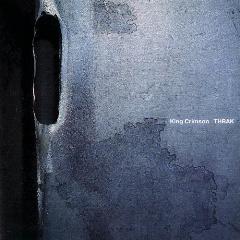King Crimson – Thrak (1995)
King Crimson – Thrak (1995)

1. Vrooom
2. Coda: Marine 475
3. Dinosaur
4. Walking On Air
5. B'Boom
6. Thrak
7. Inner Garden I
8. People
9. Radio I
10. One Time
11. Radio II
12. Inner Garden II
13. Sex Sleep Eat Drink Dream
14. Vrooom Vrooom
15. Vrooom Vrooom: Coda
Musicians:
Robert Fripp - guitar, mellotron
Adrian Belew - guitar, vocals
Tony Levin - bass, Chapman Stick, backing voclas
Trey Gunn - Chapman Stick, backing voclas
Bill Bruford – drums, percusssion
Pat Mastelotto - drums, percussion
The only progressive rock band from the '60s to be making new, vital, progressive music in the '90s, King Crimson returned from a ten-year exile in 1995 with THRAK, their first album since 1984's 3 of a Perfect Pair. As with the '80s band, guitarist/ringleader Robert Fripp recruited singer/guitarist Adrian Belew, bassist Tony Levin, and drummer Bill Bruford for this incarnation of his classic band. However, he added to this familiar quartet two new members: Chapman Stick player Trey Gunn and ex-Mr. Mister drummer Pat Mastelotto. Effectively, Fripp created a "double trio," and the six musicians combine their instruments in extremely unique ways. The mix is very dense, overpoweringly so at times, but careful listens will reveal that each musician has his own place in each song; the denseness of the sound is by design, not the accidental result of too many cooks in the kitchen. Sometimes, as in "THRAK," the two trios are set against each other, in some sort of musical faux combat. In others, they just combine their respective sounds to massive effect. On "Dinosaur," perhaps the strongest track on the record, Mastelotto and Bruford set up an ominous tom-tom groove that supports an even more ominous guitar figure. The vocal, the musings of a long-dead sauropod, are vintage Belew, just as the freaky, falling-down-the-stairs solo in the middle is vintage Fripp. Other high points include the drum duet "B'Boom" and the two Belew/Fripp "Inner Garden" pieces. Allusions to earlier Crimson abounds, such as the form of "VROOM," for example, which is suspiciously reminiscent of "Red" (from the 1974 album of the same name), or the shout-out to "The Sheltering Sky" (from 1981's Discipline) in "Walking on Air." Thankfully, this never gets annoying, but instead acts as a subtle nudge and a wink to faithful fans. King Crimson came back in a major way with THRAK, and proved that, even in its fourth major incarnation, Fripp and company still had something to say. High-quality prog. ---Daniel Gioffre, allmusic.com
Kolejny udany come-back grupy Roberta Frippa. Tym razem jednak był to powrót zupełnie niespodziewany, tak więc jeszcze bardziej radosny dla rzeszy wiernych fanów King Crimson. Pierwszy studyjny krążek po jedenastoletniej przerwie poprzedzony został interesującym minialbumem Vrooom, zawierającym trochę surowsze i momentami ostrzejsze wersje kilku kompozycji z wydanego rok później longplaya oraz dwa nowe utwory.
Płyta Thrak zapowiadała się bardzo ciekawie jeszcze przed wydaniem. Fripp skompletował bowiem nietypowy, podwójny skład, w którym znalazło się miejsce dla pary perkusistów, basistów i gitarzystów. Nowymi członkami zespołu zostali Pat Mastelotto i Trey Gunn, umiejętnościami ani trochę nie ustępujący swoim bardziej doświadczonym kolegom. Rola nowych instrumentalistów okazała się bardzo widoczna. Można zatem zaryzykować stwierdzenie, że zmiany te w znaczący sposób wpłynęły na nowy styl King Crimson, pozwalając liderowi na większą swobodę w realizacji swoich wizji artystycznych.
Jeśli chodzi o materiał Thrak, należy dokonać podziału na dwa nurty główne. Ten ciekawszy to ekspresyjne instrumentalne poszukiwania w zakresie pomysłowego, akademickiego futurystycznego rocka. Opener "VROOOM" łączy skomplikowanie rytmiczne z metalową niemalże ekspresją, zapowiadając się na spadkobiercę "Red" i "Indiscipline". Kawałek tytułowy scala zgrzyt gitarowy z kosmicznymi frippowymi soundscape'ami, kreując dziwaczną atmosferę intelektualnego sci-fi kiczu, ale razem ze wszystkimi "Vrooomami" wyznaczając nowy styl King Crimson. Miękkie, prawie barokowe, ale jednocześnie niesympatycznie odrealnione balladowanie Belewa to drugie oblicze Thrak. Trudno oprzeć się wrażeniu, że owe piosenki są tu całkowicie niepotrzebne, w żaden sposób nie przystając do nowego wizerunku artystycznego grupy, o którym wydają się raczej decydować progresywne kompozycje w rodzaju "Thrak" czy "Vroom". Pomimo zabiegów w celu ratowania konstrukcji albumu (podzielenie niektórych utworów na dwie części), sprawia on wrażenie mało spójnego, niejednorodnego stylistycznie dzieła. -–Michał Zagroba, sierpień 2001, porcys.com
download (mp3 @320 kbs):
Zmieniony (Wtorek, 29 Maj 2018 08:16)








